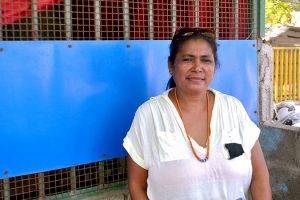It’s midday in one of Dili’s busiest markets. A man pushes a food-cart selling an Indonesian-style soup with spicy meatballs.

In an aluminum-roofed market stall, Barbara Garma Soares is shopping for football jerseys.
Soares is one of 21 women recently elected as Xefe Suku (Village Chief), in Timor-Leste’s nation-wide local elections held on 13 November. This is almost double the result from last election, in 2009, where only 11 women were elected from 442 villages.
Soares has travelled by mikrolet (mini-van) from her home in Suku Sau, a coastal fishing village two hours east of Dili, for one of her first official duties as a village chief: to buy uniforms for the village soccer team.
She had made the journey thrice before, to participate in trainings for women candidates who aspired to participate in their village elections. The trainings put together by local women’s groups together with international partners, such as UN Women, helped to inspire and prepare 319 women to stand in the local elections.
Soares explains how she applied the campaigning and leadership skills from the trainings: “I campaigned door-to-door. I didn’t make promises, but I said, if you choose me, we have to come together and we have to work together to develop our village. I can’t do it alone.”
Despite never having a woman lead their community as Village Chief before, the villagers of Suku Sau were won over by Barbara’s abilities.
The training workshops were part of a broader advocacy effort called “100% Hau Prontu” (100% I’m Ready), aimed at strengthening women’s political participation in Timor-Leste. Following the advocacy, three months before the election, the electoral law was amended, requiring each village to put forward a female candidate for the first time.
Laura Pina, Director of a local women’s group leading the advocacy effort, explains why the quota is needed: “It’s vital to shift community opinion, to show people that women are not just wives and mothers, but capable leaders at all levels.”
Timor-Leste is a patriarchal society. The home and family are mostly seen as the woman’s domain. It makes education and work harder to access for women, and roles like Village Chief are held at arm’s length.
Very high rates of violence against women is yet another obstacle for women’s advancement. It’s the most reported crime to police and Timorese women have described domestic violence as normal and sometimes, a daily occurrence [1].
The 319 women who participated in the leadership trainings were pioneers. They competed in the local elections along with 1,752 men. Graciana Da Silva is from Suku Laidohor, located one hour along the coast of Dili, near the border with Indonesia. As a single mother, she put herself forward as a candidate against all odds. “I was the only woman candidate up against six men. In the next village over, my friend was up against 10 men and it was the same in the next village,” she says. However, Da Silva wasn’t successful this time.

